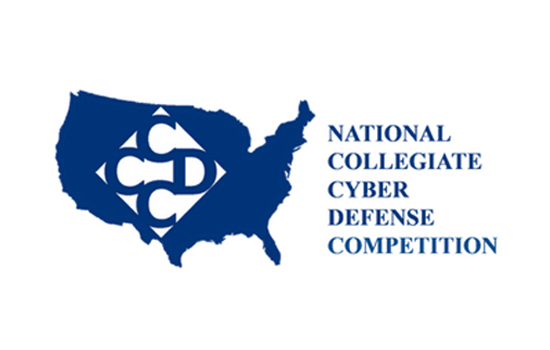RIT wins regional cyber defense competition
Students from nation’s top cybersecurity colleges flex their skills, practice defending
RIT took first place in the 2017 Northeast Collegiate Cyber Defense Competition. The win gives RIT an automatic bid to the national tournament April 13-15 in San Antonio, Texas.
A team of Rochester Institute of Technology cybersecurity students is heading to the National Collegiate Cyber Defense Competition after taking first place at the regional competition March 17–19.
Ten teams competed in the annual Northeast Collegiate Cyber Defense Competition, which was hosted at RIT this year. Northeastern University placed second, while University at Buffalo took third.
The win gives RIT an automatic berth to the 2017 national competition (NCCDC), held April 13–15 in San Antonio, Texas.
The annual event is part of the nation’s largest college-level cyber defense competition, an extracurricular event that helps to train the next generation of cybersecurity experts. The competition gives student teams the opportunity to assume responsibility for the information technology operations of a simulated organization, allowing them to apply cyber defense skills in a real-world scenario.
“Competitions like CCDC are important because they give us a great way to foster our skills and create bonds,” said Cameron Clark, a third-year computing security student and captain of the RIT team. “Just like with a typical sports team, the best way to grow closer to your peers and create the drive to better your skills is through competition.”
For the scenario, a group of industry professionals are assigned to break into computer networks to exploit information from a mock company. Teams of students are hired by the company to prevent that information theft from occurring.
Teams were scored on their ability to detect and respond to outside threats, maintain existing services, respond to business requests such as the addition or removal of services, and balance security needs with business needs.
“Competing in CCDC is complete chaos—you have to manage your infrastructure, while also completing business tasks and fending off attackers,” said Clark, who is from Saco, Maine. “You rely heavily on what you know and what your teammates know.”
Other participants in the regional competition included Harvard University, Champlain College, Syracuse University, University of Maine, University of New Hampshire, Utica College and Westchester Community College.
The RIT student team is made up of Clark; Kyle Carretto, a third-year computing security student from Corfu, N.Y and co-captain of the team; Brandon Adler, a third-year computing security student from Pittsford, N.Y.; Joe Graham, a third-year computing security student from New Hampton, N.Y.; Ryan Whittier, a fourth-year computing security student from Rochester, N.Y.; Dave Kukfa, a fourth-year computing security student from Penfield, N.Y.; Ben Bornholm, a fourth-year computing security student from Royersford, Pa.; Micah Martin, a second-year computing security student from Fort Loudon, Pa.; Sean Sun, a second-year computing security student from Fresh Meadows, N.Y.; James Trimer, a computing security graduate student from Rochester, N.Y.; Kristen Tumacder, a third-year computing security student from Aiea, Hawaii; and Hans Johnson, a fourth-year computing security student from Middleport, N.Y.
The RIT team is coached by Bill Stackpole, professor of computing security in RIT’s B. Thomas Golisano College of Computing and Information Sciences.
In the past, RIT has been among the top contenders at the national competition in San Antonio, placing third in 2015, second in 2014 and winning the national title in 2013. The northeast regional competition has run for 10 years, with RIT hosting the competition in 2008 and 2009.
In 2012, RIT broke the mold of traditional cybersecurity education by creating the Department of Computing Security, the first academic department devoted solely to computing security. Today, RIT is helping to fill a national need for qualified computing security professionals as a National Center of Academic Excellence in Information Assurance/Cybersecurity Education designated by National Security Agency and Department of Homeland Security.













